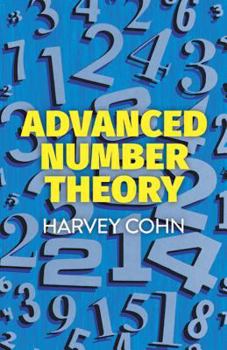Advanced Number Theory
"A very stimulating book ... in a class by itself." -- American Mathematical Monthly Advanced students, mathematicians and number theorists will welcome this stimulating treatment of advanced number... This description may be from another edition of this product.
Format:Paperback
Language:English
ISBN:048664023X
ISBN13:9780486640235
Release Date:August 1980
Publisher:Dover Publications
Length:288 Pages
Weight:0.69 lbs.
Dimensions:0.6" x 5.6" x 8.2"
Customer Reviews
3 ratings
All about quadratric number fields, but little else
Published by Thriftbooks.com User , 21 years ago
From 1962, this is a detailed account of quadratic number fields, and makes a fair introduction to the theory of number fields of any degree. Ideal theory (restricted to the quadratic case) is well covered in plenty of detail. Gauss's classic theory of binary quadratic forms is also included.Cohn is clearly quite keen on the subject, and is not just writing a textbook on some arbitrary topic for which he thinks there might be a market. And he has no fear of including pedagogical remarks in a textbook. The English is a bit awkward in places, but that is a minor thing.The basics about characters and Dirichlet L-series are developed, but only to the extent needed to give Dirichlet's original proof of his theorem on arithmetic progressions. That proof, unlike later ones, uses Dirichlet's class number formula for quadratic fields, and is worth a look.There is a lengthy but now dated bibliography.An unusual feature is a table (from Sommer's 1911 book) describing the structure of Z[sqrt(n)] for all nonsquare n from -99 to 99.
Advanced, but now dated. Still useful.
Published by Thriftbooks.com User , 24 years ago
This is definitely an advanced book. But no book claiming to be advanced can hold that title for long since mathematical research is progressive. As advanced as the book is, it's just an introduction to advanced number theory now, and dated in places. This book was orginally published as "A Second Course in Number Theory " in 1962. I own several books by Harvey Cohn and I appreciate his writing style. He writes with the complete book in mind and every chapter and paragraph is cohesively developed. His writing (between the numerous equations, tables and proofs) is lucid and conversational with historical motivation. He places a strong emphasis on ideal theory, and quadratic fields. In this regard the book is almost redundant given his "Class Field Theory" book. Be warned there is some dated material in this book. It is prior to Alan Baker's 1966 proof about d=-163 and imaginary quadratic fields, and such is still only conjectured in the text. And of course, FLT wasn't on Wiles' check list when this book was published.It doesn't cover prime-producing polynomials or transcendental functions and their relation to class field theory, like one would hope (I guess the world had to wait for Baker for that). And forget about rational points on elliptic curves, none at all. It's from the period when elliptic equations were poo-pooed as relics before being brought to the fore again by recent developments.Despite all the short-comings, I can still recommend the book as a worthy edition to your number theory library. Just don't put it at the top of your lists (unless you're short on cash and Dover is all you can afford).
A book only for advanced students !
Published by Thriftbooks.com User , 25 years ago
by the name itself you'll understand that the book is not for patzers, so don't take it for your introduction towards number theory..get a grasp of number theory from some other books and then polish your skills using this one .






